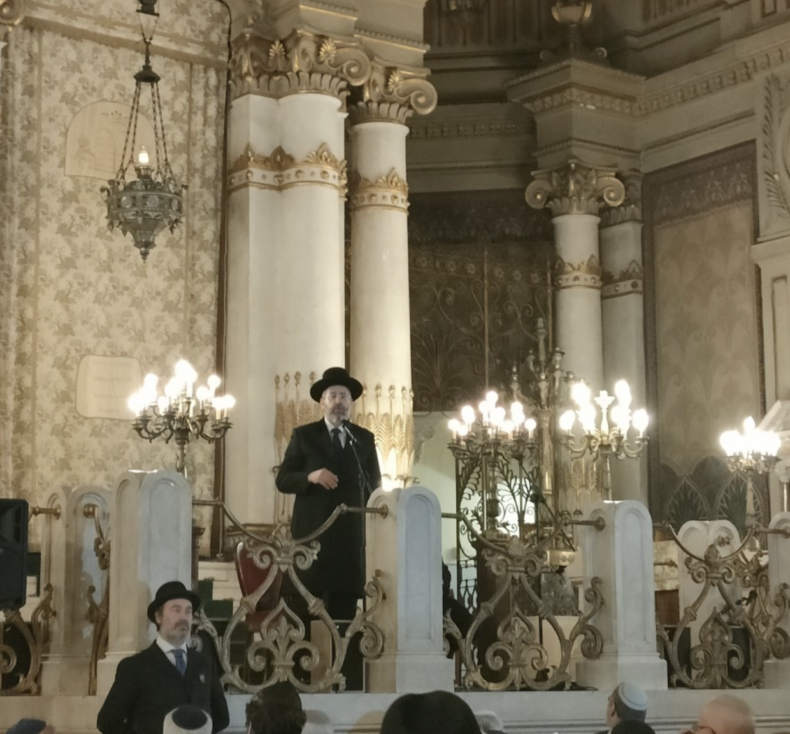Rabbi Lau at the Great Synagogue of Rome: “Unity in action and in respect for the other”

“In Israel’s Declaration of Independence, the idea that it was a Jewish State to be founded recurs multiple times. In the following 75 years we have repeatedly asked ourselves what the meaning of this concept is, but with discussions that instead of focusing on the principles have often turned into quarrels between people. It is therefore important to remember, even in this context, that discussion is essential, but without ever losing sight of mutual respect and recognition”. These are the words with which the Ashkenazi Chief Rabbi of Israel Rabbi David Lau, guest of the Rome Jewish Community, addressed the audience in the Great Synagogue, during one of the many meetings in which last week he was featured at some of the city’s synagogues and at the Italian Rabbinical College, where he gave a lecture on Halakha.
Welcoming him to the Great Synagogue was the chant of children, who were singing Shir HaMaalot, one of the most representative songs of Jewish and Israeli identity. A melody that, as the Rabbi explained, led him to reflect on the meaning and the challenges that Israel has been called to face. Starting from November 1947, the day the United Nations voted in favor of a Jewish State, until today.
All of this, he stressed, in the name of a dream and of a long-standing promise. At his side were the Rabbi of Rome Riccardo Di Segni and the Coordinator of the Italian Rabbinical College Rabbi Benedetto Carucci Viterbi. Rav Lau explained “We can confront each other, as Israel is after all a democratic State, but on the essential Jewish matters we can’t but agree. Every day we wear tefillin, on our head and arm. They are also a symbol: at the level of thought there can be an open dialectic on many issues, even on the different rituals and traditions to follow, but when it comes to action, this must be unified. In the matters of substance, we can’t afford separations”. Turning his attention on the upcoming festival of Passover, the Rabbi recalled how “many aspects of this celebration are related to number four: four are indeed the cups of wine we drink, four are the questions we ask, four are the types of children we meet. This is so because, at his time, the Lord made us as many promises: I will lead you out of Egypt, I will save you from slavery, I will redeem you and I will take you to the Promised Land”. Israel and the Jewish people as a whole, concluded the Rav, “are carrying on a tradition that began on the Mount Sinai”.
Rabbi Lau had previously been in Milan, guest of the local Jewish Community, issuing in that context as well a call for unity and cohesion. Still discussing tefillin he had said: “In the box we place on our head, the texts are divided into four parts, while in the one we put on our arm, they are all together. This means that in the head, in the matters of thought, we can differ and have different opinions; but we must find again unity in the arm, in the action. The Jewish people is a whole and has always found unity in itself, despite the divisions”. A unity that for Rabbi Lau is expressed “in the faith in God, in the observance of precepts and of prohibitions”.
Translated by Laura Cattani and revised by Valentina Megera, students at the Advanced School for Interpreters and Translators of the University of Trieste, interns at the newspaper office of the Union of the Italian Jewish Communities – Pagine Ebraiche.
